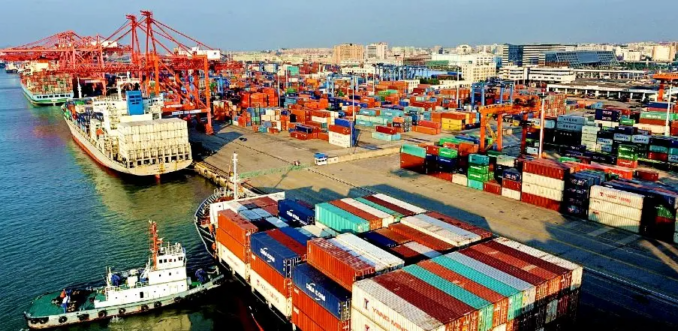
2023 has been a bitter and sweet year for the nation’s maritime sector. The sector experienced policy inconsistencies, new appointments, creation of a new ministry, new port infrastructure, and importantly, another failed year for local shipowners.
Accordingly, the outgoing year was the year the government expressed readiness to rehabilitate the old and dilapidated port infrastructure, appointment of a career Customs officer, Adewale Adeniyi, as Comptroller General, the rehabilitation of Mission To Seafarers’ building by the Nigerian Ports Authority (NPA), among others.
Other activities that shaped the year under review are as follow:
Commissioning Of First Deep Seaport In Nigeria
In January 2023, ex-President Muhammadu Buhari, commissioned the first ever deep seaport in Nigeria. The $1.5billion infrastructure was also Nigeria’s first automated port.
According to the federal government, the port was expected to wrest lost cargoes from seaports in rival neighbouring countries to Nigeria.
The new port, which can handle very large vessels, commenced commercial operations by the beginning of the second quarter of 2023, and sent shockwaves down the spine of operators in the sector.
Also, the seaport put operators of river ports like Apapa and Tin-Can on their toes as they as well announced the arrival of very large vessels in their port terminals.
The entrant of Lekki Port into Nigeria’s maritime space has had positive impact on the nations port operations because very large vessels that previously wouldn’t want to come to Apapa and Tin-Can Ports, now come to these ports following improvement in vessel handling capacities by the various port operators of these river ports due to the competition posed by the presence of Lekki Port.
“For a long time, the ports in Lagos have been facing traffic congestion, low draught level, poor cargo distribution capability, and undeveloped road network, thus Nigerian foreign trade has been significantly impeded, and Nigeria was losing the transshipment hub status to other West African countries in the past decades.”
“Lekki Port will promote the take-off of Nigeria’s economy and the prosperity of foreign trade, flourish many related industries, and create massive jobs. It is estimated that the overall economic benefit will reach $361 billion over the next 45 years, and 170,000 direct and indirect jobs will be created,” a document from Chinese embassy stated
Improved Maritime Security
Since the deployment of the Integrated Marítime Security Architecture also known as Deep blue, by the Nigerian Maritime Administration and Safety Agency (NIMASA), Marítime crimes such as piracy and sea robbery have gone down drastically in the nation’s coastal water and Gulf of Guinea (GoG).
The security architecture jointly operated in collaboration with the Nigerian Navy was to ensure adequate policing of the nation’s maritime domain.
Speaking in April 2023 when he received the Norwegian Minister of Foreign Affairs, Ms Huitfeldt Anniken, in his office in Lagos, NIMASA DG, Dr. Bashir Jamoh revealed that, “Nigeria recorded 82 cases of sea piracy in its waters in 2018, but that dropped to 61 in 2019 and down to 34 cases in 2021.
By 2022, we recorded zero piracy attacks and maintained that record up till the first quarter of 2023. With the zero-record feat which started in 2022, the International Bargaining Forum (IBF) in February 2023 removed Nigeria from the list of countries designated as risk maritime nations.
Even though the International Maritime Bureau (IMB) has raised the alarm over the likely resurgence of piracy in the Gulf of Guinea waters, NIMASA in collaboration with the Nigerian Navy has been able to keep the threat level within check all through 2023, leading to further calls for the removal of War Risk surcharges on Nigerian bound cargoes.
Exchange Rate Volatility
Exchange rate volatility had affected imports so badly in 2023 that government revenue was affected.
It was gathered that importation into the nation’s seaports dropped down to 65 per cent in the last quarter of the year due to instability of foreign exchange and devaluation of Naira.
Sources in the seaports have told our correspondent that berths in the Apapa and Tin-Can Island ports are empty, especially in terminals that are handling bulk cargoes. Also, truckers have complained about drop in cargo haulage due to the decrease in import at the two busiest ports in the country.
A truck owner, Yusuf Liadi, said haulage of cargo laden containers in the last one month has fallen to the lowest level. “The last four weeks have been very challenging for truck owners. For instance, I have not moved cargoes out of the port in the last two weeks,” he lamented.
VLCSs Visit Nigerian Seaports
Kota Cantik has a carrying capacity of 6606 TEU with a current draught of 13.4 meters. Her length overall (LOA) is 299.95 meters and her width is 40.11 meters.
MSC MAUREEN, on her part, is the largest container ship ever to berth at Lagos ports as it brought great significant economic benefits to Nigeria. MSC MAUREEN, is a 6,750 TEU ship with a draught of 12 metres, LOA of 300 metres and beam of 40 metres.
Also, on Monday, MV Great Lagos with 249m Length; 39m Width; 9.8m Draught made a maiden voyage to the PTML Terminal.
MV Great Lagos is currently the largest vessel in the world in the category of combining Containers and Roll on Roll Off, also known as vehicles. Also, the MV Lagos has a capacity of 2,500 vehicles and 2000 containers on a voyage.
NPA Reinstated INTELS Boat Pilotage Monitoring Contract
The Nigerian Ports Authority (NPA) says the country would save $326.8 million, due to waivers from the agreement it reached with Intels Nigeria Limited on the boat pilotage monitoring contract.
NPA said it agreed to a $100 million waiver over its outstanding indebtedness to Deep Offshore Services Limited, with which it has a supplemental agreement for the phase 4B port development.
The agency said there had been a further waiver of the interest accruing on the outstanding debt under the phase 4B agreement for the period of two years, estimated at $93,317,556.
“The Authority will be saving a total sum of $326,895,226 as a result of waiver of part of accrued interest and reduction of interest rate from 6.5 per cent to three per cent on the debt over the next 15 years,” the NPA said.
“(There’s another) reduction of the agency’s commission on pilotage collections from 28 per cent to a lower commission of 24.5 per cent as opposed to increasing it due to astronomical rise in cost of operations.
“The proposed spread of the debt of $522,433,453.25 to be paid back over a 15-year period will, of itself, earn for the Authority a huge benefit in terms of preservation of funds to meet its other operational needs over the period.”
To address the associated loss of revenue and resolve the legal impasse resulting from the dispute, the authority said it proposed a settlement initiative with Intels, which was submitted to the federal government through the ministry of transportation.
Failed CVFF Disbursement
The year also began on a high for indigenous shipowners seeking the disbursement of the over $700 million Cabotage Vessel Financing Fund (CVFF).
Recall that the CVFF was established alongside the Nigerian Coastal and Inland Shipping (Cabotage) Act of 2003, to empower indigenous ship-owners to take control of the nation’s coastal and inland shipping business, otherwise known as the Cabotage trade.
Towards the end of the administration of Muhammadu Buhari presidency, five Primary Lending Institutions (PLI’s), Zenith, Polaris, United Bank of Africa (UBA) Jaiz and Union Bank were all appointed to handle modalities for the disbursement of the CVFF to indigenous shipowners.
Briefing journalists after a meeting at NIMASA headquarters in January, the director general of NIMASA, Dr Bashir Jamoh stated that the modalities to be released by the five banks include the interest rate, tenure, collateral and requirements needed to access the fund.
However, the end of President Buhari’s tenure as Commander-In-Chief mid-2023 and the emergence of President Bola Tinubu’s administration seems to have slowed down the disbursement of the CVFF, as the fund has remained undisbursed all through 2023 and the country has continued to incur losses due to a lack of capacity on the part of the indigenous ship-owners.

Be the first to comment